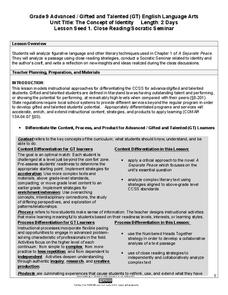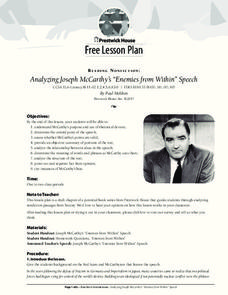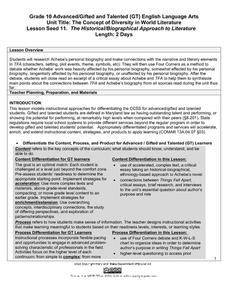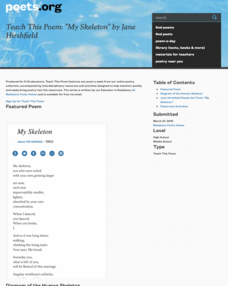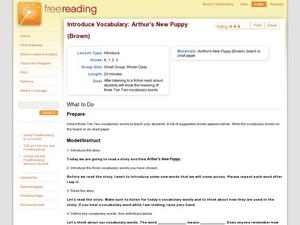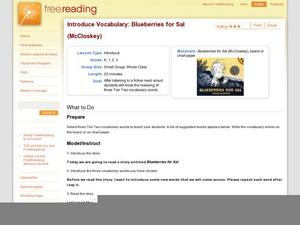Curated OER
Word Reference Materials
A class discussion on reference materials opens up a lesson on how to use these important resources. They discover that dictionaries, glossaries, and thesauruses are called word reference resources, and they practice using them. The...
Curated OER
Using the Comprehension Strategies
High school learners review the six major reading comprehension strategies. They demonstrate the strategies by putting them into action using more complex reading. They finish by discussing a seventh strategy, monitoring comprehension.
Curated OER
Learning Vocabulary by Using Reference Materials
Finding engaging ways to help your middle schoolers build their vocabulary is not easy to do. The lesson presented here offers a great way to motivate them to build vocabulary by making it into a game. Teams of pupils use a dictionary...
Maryland Department of Education
The Concept of Identity Lesson 1: Close Reading/Socratic Seminar
John Knowles' A Separate Peace provides readers with an opportunity to develop their close reading and analytical skills as they look for what Knowles feels are the factors that shape our identity.
EngageNY
Close Reading and Viewing: Nunavut Iron Ore Mine Approval
Using the thought-provoking resource, scholars continue researching opposing points of view about the Mary River Project proposal. They read an informational text, watch a video, and record the gist of the text and video in their journals.
Curated OER
Reference Materials
Students discuss reasons to use reference materials, identify correct reference material to use for specific information, find answers to specific questions by locating information in encyclopedia, dictionary, atlas, almanac, glossary,...
Curated OER
Understanding American Values
Scholars read books and discuss emotions that lead up to the American Revolution. They also discuss vocabulary and use reference materials to research the Internet for causes and sentiment that led to the American Revolution.
Maryland Department of Education
The Concept of Diversity in World Literature Lesson 8: Nonfiction Close Reading
As part of their study of Things Fall Apart, class members conduct a close reading of a section of Chinua Achebe's essay, "An Image of Africa: Racism in Conrad's Heart of Darkness." Jigsaw groups then compare the voice in the essay...
Washington State Department of Health
Let's Cook!
Recipes, tasting activities, images of fruits and veggies, fun food facts... you name it, this resource has it! Your class will be cooking up wonderful dishes in no time with these materials. Included here are recipes, handouts,...
Prestwick House
Reading Nonfiction: Analyzing Joseph McCarthy's "Enemies from Within" Speech
Looking for a lesson plan that teaches class members how to analyze nonfiction? Use Joseph McCarthy's famous "Enemies from Within" speech as a instructional text. Worksheet questions direct readers' attention to the many historical...
Curated OER
Fossil Fuels (Part I), The Geology of Oil
Junior geologists work through three mini-lessons that familiarize them with the formation and location of fossil fuels. Part one involves reading about petroleum and where it comes from via a thorough set of handouts. A lab activity...
Maryland Department of Education
The Concept of Diversity in World Literature Lesson 11: The Historical/Biographical Approach to Literature
How affected is Thinks Fall Apart by Chinua Achebe's personal biography? Using a four corners strategy, and evidence from their readings, class members debate the degree of biographical influence in Achebe's novel.
Museum of Disability
Stand in My Shoes
Stand in My Shoes, a story by Bob Sornson, is an effective way to teach young learners about empathy and making friends. Once pupils read through the story, they answer a series of discussion questions and complete reading activities...
Curated OER
The Boy in the Striped Pajamas: Questioning Strategy
Asking questions about the text is a great way for kids to become self-sufficient readers. Use the question-and-response strategy (QAR) to get them thinking about John Boyne's The Boy in the Striped Pajamas. After they read select...
Curated OER
Mini-Lesson Planning for Inferences
Making inferences and drawing conclusions is a key component to successful active reading. Encourage your class to use context clues and prior knowledge to infer different elements of a story, including the setting, plot, and character...
EngageNY
Reading and Writing About How to Perform a Process: How Meg Lowman Studies the Rainforest (Pages 4–8)
It's a process. Scholars read to understand the process Meg Lowman uses for pressing specimens. Learners work in groups to define vocabulary and create a list of the steps used. They then carry out the steps using provided materials.
Curated OER
Teach Text Features & Read Nonfiction
Elementary schoolers examine the components of reading nonfiction. They use think-alouds to help them complete reading the selected sections. They also identify text features as they read.
Curated OER
Fluency: High Frequency Words
Boy, this lesson sounds like a high frequency blast. If you think that sounded sarcastic, it was. Learners watch as the teacher reads the high frequency word..... the! They read the word with the instructor over and over until they have...
Academy of American Poets
Teach This Poem: "My Skeleton" by Jane Hirshfield
Jane Hirshfield's poem "My Skeleton" asks readers to pause and think about the amazing, often taken-for-granted structure that protects and gives form to human bodies. After observing the human skeleton's image, class members read the...
Curated OER
Introduce Vocabulary: Arthur's New Puppy (Brown)
Learn new words as you read Marc Brown's story, Arthur's New Puppy. This is focused as a vocabulary-in-context activity (though this strategy could be used with any book and set of words). Introduce the new words you will focus on:...
Curated OER
Introduce Vocabulary: Clifford the Big Red Dog (Bridwell)
Clifford the Big Red Dog is here to introduce some new vocabulary terms in context to young readers. Although this activity is designed around Norman Bridwell's picture book, the strategies are applicable for any text. Introduce the new...
Curated OER
Introduce Vocabulary: Animal Action ABC
Explore the meanings of tier two vocabulary words. In small groups, young learners listen to a read-aloud story and evaluate new vocabulary words for their meaning.
Curated OER
Introduce Vocabulary: Are Trees Alive? (Miller)
Explore the life inside trees as scholars learn vocabulary through Debbie Miller's informational text Are Trees Alive? Familiarize pupils with the new words they will hear like anchor, disease, awaken, harsh, and swell before reading....
Curated OER
Introduce Vocabulary: Blueberries for Sal (McCloskey)
Take your budding readers on a literary trip to pick blueberries as they learn vocabulary from Robert McClosky's book, Blueberries for Sal. By pre-teaching the words pupils are prepared to raise their hands when they hear the words in...





